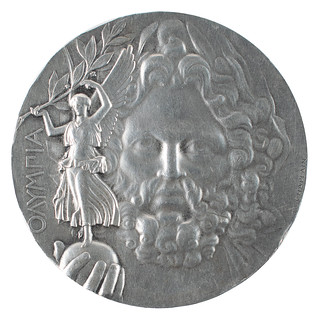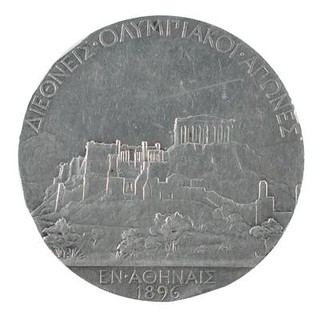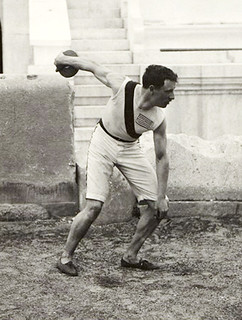
PREV ARTICLE
NEXT ARTICLE
FULL ISSUE
PREV FULL ISSUE
FIRST PLACE MEDAL AT THE 1896 OLYMPICSLast week Pete Smith proposed giving an E-Sylum Smarty-Pants Award to the first correct response to this question: Who won the first gold medal at the 1896 Athens Olympics? -Editor Michael Kodysz writes: From a Google search: "On 6 April 1896, the American James Connolly won the triple jump to become the first Olympic champion in more than 1,500 years." Bob Steinberg came up with that answer, too. -Editor Bruce Bartelt writes: "The first 1896 Olympic gold medal was won by Robert Garrett, son of T. Harrison Garrett." Chriss Hoffman writes: "From my understanding there was no gold medal awarded at the 1896 Olympics in Athens, First place winners received a silver medallion from the King George of Greece, an olive branch and a diploma. Second place finishers received a copper medallion, a laurel branch and a diploma Third place finishes received nothing. So nobody won a gold medal in the 1896 Athens Olympic games. The medals we know today for first, second and third place in events started in 1906 also held in Athens, Greece." Thanks everyone. Looks like Chriss is our E-Sylum Smarty-Pants Award winner for this week. Here's Pete's article. -Editor
Last week we posed this question: Who won the first gold medal at the 1896 Athens Olympics? The correct answer is no one. At the Athens Olympics, winners received silver medals. Gold medals were not presented until eight years later at the 1904 Olympics in St. Louis.
Robert Garrett was a star athlete at Princeton and one of fourteen American men who travelled to Athens for the event. They were up against mostly European competitors and about 169 from Greece. American athletes came from Harvard, Princeton and the Boston Athletic Association. There were no Olympic trials and no government or corporate funding. James B. Connolly was forced to withdraw from Harvard when the school would not grant him a leave of absence to attend the Olympics. In the first final of the games, he won the triple jump (hop, skip and jump) to become the first Olympic winner since ancient times and the first American winner. The discus was the second event with eleven participants. Garrett had not seen an Olympic discus before he arrived in Athens. His first two throws were awkward and ineffective. His third throw sailed to first place in an upset victory over mostly Greek competition. He later took first place for the shot put and second in two other events.
Garrett tried to defend his title in 1900 but all of his throws hit trees. Apparently, no one noticed the trees when selecting the site. Garrett outlived his teammates. Upon his death in 1961 he was declared, Robert Garrett inherited a coin collection from his father, T. Harrison Garrett, in 1888. In 1919 he traded the collection to his older brother, John Work Garrett, for art objects. Bowers tells how the Garrett collection was stored in vaults at Robert Garrett & Sons. In 1902 the company moved to the sixteen story Continental Building, the tallest building in Baltimore. In February 1904, a 30-hour fire raged through downtown Baltimore destroying 1500 buildings and the contents of the Continental building but the structure survived. The building has been renamed One Calvert Plaza and is three blocks north of the inner harbor and the Baltimore Convention center. Garrett lost some 17th century English tokens and early medals in the fire. Fortunately, he had moved the bulk of the collection to Princeton just weeks before the fire. Garrett was a caretaker for the collection but did not build the collection as much as his father or his brother. John Work Garrett donated the collection to Johns Hopkins University. Perhaps some smarty-pants E-Sylum reader will know what happened to the collection from there. Thanks. Great story. This week an example of the silver medal from the 1896 games was sold for a record price. Image shown above. -Editor A rare first-place medal from the first modern Olympic Games has sold for more than $180,000. Boston-based RR Auction said Friday that the winning bidder for the silver medal from the 1896 games in Athens, Greece, was a collector based on the East Coast. The company estimated before the auction that the first place medal could fetch about $75,000. At the inaugural Olympiad, first-place winners were awarded silver medals and second-place finishers earned bronze, the auction house said. There was no award for placing third. “Any winner's medal from the historic debut of the 1896 Olympic Games remains exceedingly rare, said Bobby Livingston, RR Auction's executive vice president.
To read the complete article, see:
To read the complete lot description, see:
Next up? Pete Smith offers an E-Sylum Smarty-Pants Award for the first correct response to this question: What member of the ANA Numismatic Hall of Fame won an Olympic medal? -Editor
To read the earlier E-Sylum article, see:
Wayne Homren, Editor The Numismatic Bibliomania Society is a non-profit organization promoting numismatic literature. See our web site at coinbooks.org. To submit items for publication in The E-Sylum, write to the Editor at this address: whomren@gmail.com To subscribe go to: https://my.binhost.com/lists/listinfo/esylum All Rights Reserved. NBS Home Page Contact the NBS webmaster 
|



